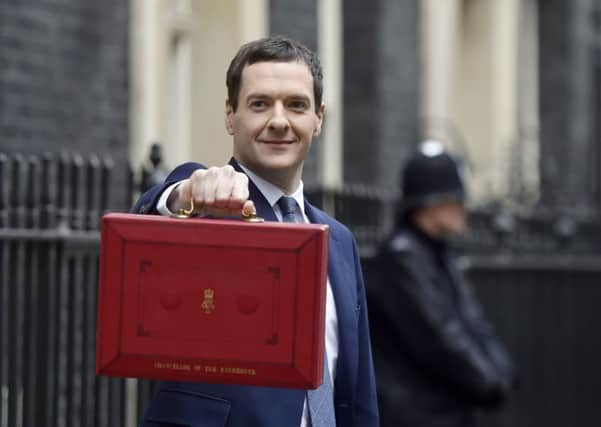Budget 2016: As it happened


The Chancellor said that, although the UK’s economy is expanding, it faces a “dangerous cocktail of risks” from around the world and the independent Office for Budget Responsibility (OBR) had revised down its estimates of economic growth.
The OBR expects UK economic expansion to slow to 2 per cent this year, down from 2.2 per cent in 2015 and lower than its previous 2.4 per cent forecast.
Advertisement
Hide AdAdvertisement
Hide AdFigures were also revised downwards for the following years – from 2.5 to 2.2 per cent in 2017, from 2.4 to 2.1 per cent in 2018 and from 2.3 to 2.1 per cent in both 2019 and 2020.
In response to plunging oil prices, the Chancellor said he would support the North Sea industry by halving the supplementary charge on ring-fenced products to 10 per cent, adding that he was scrapping the petroleum revenue tax. The announcement prompted Tory MPs to gesture wildly at the SNP benches, urging them to support the move.
Osborne said: “The oil and gas sector employs hundreds of thousands of people in Scotland and across our country. But the oil price has continued to fall. So we need to act now for the long term.
“We are only able to provide this kind of support to our oil and gas industry because of the broad shoulders of the United Kingdom. None of this support would have been remotely affordable if, in just eight days’ time, Scotland had broken away from the rest of the UK, as the nationalists wanted.
“Their own audit of Scotland’s public finances confirms they would have struggled from the start with a fiscal crisis under the burden of the highest budget deficit in the western world. Thankfully, the Scottish people decided that we are better together in one United Kingdom.”
Today’s Budget was nervously awaited by many drivers who had feared the first rise in fuel duty for five years, but the Chancellor said the levy would again be frozen, saving the average driver £75 a year and delivering what he described as a “tax boost that keeps Britain on the move”.
However, hopes for a cut in the duty charged on Scotch whisky – which accounts for a fifth of the UK’s food and drink exports – were dashed when Osborne said there would be no changes to the tax on Scotch, beer and cider.
Tobacco duty will rise by 2 per cent above inflation, with hand-rolling tobacco up by an additional 3 per cent.
Advertisement
Hide AdAdvertisement
Hide AdIn a move that will be welcomed by child health campaigners, Osborne announced a sugar tax on the soft drinks industry, which will raise an estimated £520 million a year.
Fines from banks caught up in the Libor-rigging scandal will pay for community facilities in Helensburgh and for naval personnel at Faslane, he said.
He also revealed that corporation tax will be cut to 17 per cent by April 2020 – down from its current level of 20 per cent – and promised to deliver a low-tax regime in a bid to attract more multinational employers, but pledged they would be made to pay all due taxes.
Osborne insisted there would be no backing away from plans to wipe out the deficit despite “headwinds” in the global economy, and Britain was “prepared for whatever the world can throw at us”.
Delivering one of his tightest Budgets yet, the Chancellor said the country was benefiting because the government had “stuck to the task”.
While he said the government was still on course to record an overall surplus by 2019-20 – one of the key targets he has set himself – he confirmed that he would miss another aim, for debt to be falling as a proportion of GDP this year.
After record employment figures released this morning, the OBR is forecasting one million more jobs over the course of this parliament.
Osborne said that, far from predictions that new jobs would be low-skilled and part-time, some 90 per cent are in skilled occupations and three-quarters are full-time.
Advertisement
Hide AdAdvertisement
Hide AdThe Chancellor said he would be introducing additional spending cuts totalling £3.5 billion by 2020 – lower than the £4bn predicted. He has blamed uncertainty over the prospects of China and the eurozone for dispelling the sunny mood of the Autumn Statement four months ago, when he said that higher-than-expected tax receipts would allow him to avoid cuts.
After ministers bore the brunt of public criticism during a winter of severe flooding, Osborne announced a £700m boost to funding for flood defences and resilience. The fund will be paid for by increasing the standard rate of insurance premium tax by half a percentage point.
